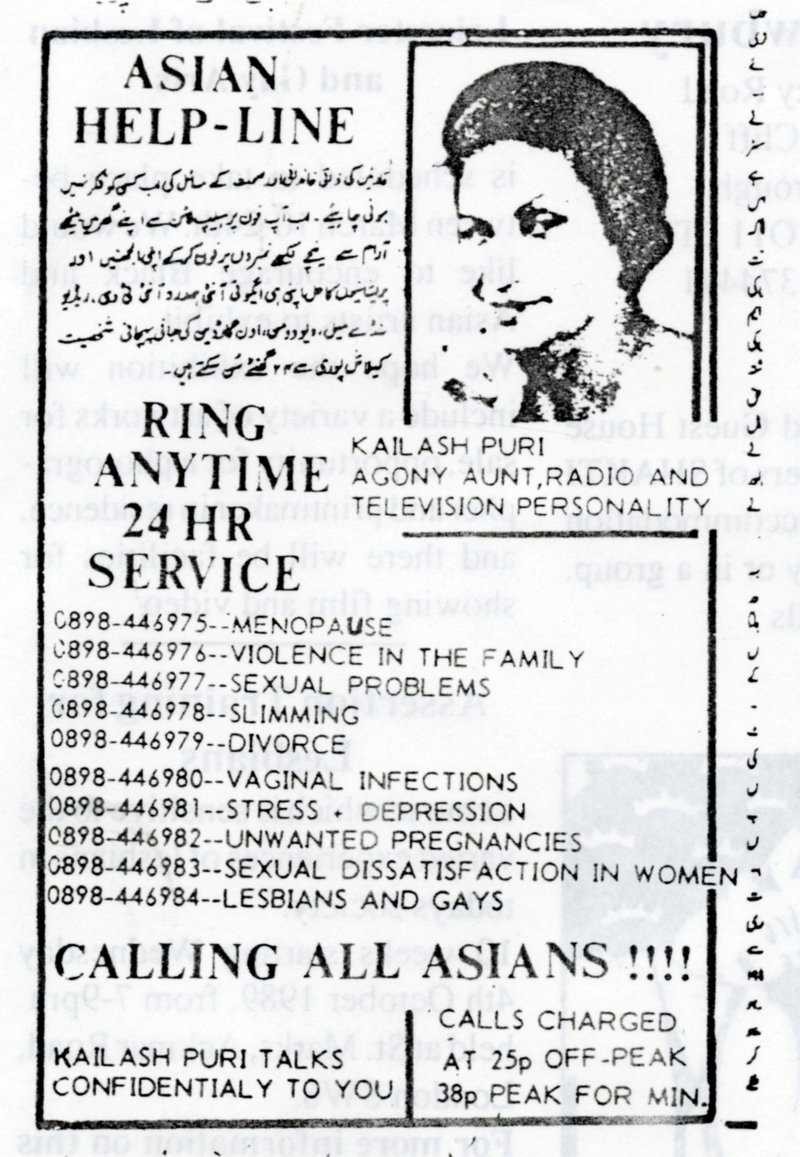
Kailash Puri
‐
Punjabi agony aunt, relationship expert and author
Other names
Humraaz Maasi
Place of birth
Date of arrival to Britain
Place of death
Ealing, London
Date of time spent in Britain
1946–50, 1968–2017
About
Kailash Puri was born in Rawalpindi, Punjab. Her father, Sohan Singh Puri, was a wealthy building contractor. She grew up in her father’s ancestral village, Kallar and, later, Lahore. In 1943 she married the scientist Gopal Singh Puri. In 1946 Kailash migrated to London to join her husband, where he was undertaking a PhD at University College, London. In 1947 Kailash had her first child, and in 1950 the Puris returned to India and lived in Pune, where Gopal worked for the Botanical Survey of India. It was here that Kailash’s career in journalism began. She started writing for local newspapers, such as Punj Dariya in Jalandhar, and helped launch a Punjabi women’s magazine named Subhagwati with her husband. Kailash also gave birth to two children during this time in India. The family subsequently moved to Nigeria and Ghana, where Gopal held academic posts. In 1968 the Puris settled in Crosby, Merseyside so Gopal could undertake a new post as a human ecologist at the University of Liverpool.
In the late 1960s Puri launched the Punjabi magazine Roopvati, and published articles relevant to her target audience, namely Punjabi women. The articles ranged from recipes to contraception. Her publications were popular among Punjabi diasporic communities in Britain and around the world. Alongside her work as a journalist, which involved writing for magazines such as Des Pardes and the Punjab Times, Puri was actively involved in community relations in Liverpool. During the 1960s she taught cookery classes and ran Punjabi language lessons for professionals who were interacting with newly arrived Punjabis. By the mid-1970s she was a founding member of the Liverpool Race Relations Board.
Puri’s public profile grew as she wrote books and offered readers advice on sex and relationships, for which she became well-known. Women from around the world wrote in to her magazine anonymously and Puri became an agony aunt, offering advice on issues such as difficult family relationships and domestic abuse. She also visited women in their homes, and couples would come to her home for consultations. She often appeared on British South Asian television and radio to share her advice on relationships. Her advice on sex received backlash from religious leaders, who thought her work was not respectable. In addition, communicating advice in the Punjabi language was made difficult by its limited vocabulary related to sex and anatomy. Given this, Puri developed new terminology so she could convey her advice with precision.
Puri also published works of fiction and poetry, as well as cookery books. As a result of her Indian recipe books, Kailash became Marks and Spencer’s first Indian cooking consultant in the 1970s, as the company developed a new range of Indian ready meals.
In 1995 Gopal Singh Puri died and afterwards Kailash moved to Ealing. In 2013 her autobiography, Pool of Life: The Autobiography of a Punjabi Agony Aunt, was published. This was written with academic Eleanor Nesbitt. During her life, Puri received multiple awards for her writing including a Bhai Mohan Singh Vaid award and Millennium Woman Award, presented to her by the Mayor of Ealing.
Highlights of Indian Cookery (1972)
The Mysteries of India Cuisine Explained: Englishman’s Guide to Indian Cookery (Liverpool: Arndale Supplies, 1975)
Seja Sanjha (1980)
Sej Uljhana (2002)
Puri, Kailash and Nesbitt, Eleanor, Pool of Life: The Autobiography of a Punjabi Agony Aunt (Liverpool: Liverpool University Press, 2013)
Chandan, Amarjit, ‘Kailash Puri Obituary’, Guardian (4 July 2017)
Nesbitt, Eleanor, ‘In Remembrance: Kailash Puri (1925–2017)’, Global Institute for Sikh Studies (2017)
Puri, Shammy, ‘My Mother’s Unlikely Journey to Becoming the Agony Aunt for Punjabi Men and Women around the World’, Scroll.in (17 April 2021), https://scroll.in/article/991886/my-mothers-unlikely-journey-to-becoming-the-agony-aunt-for-punjabi-men-and-women-around-the-world
Roberts, Luke, Living in History (Edinburgh: Edinburgh University Press, 2024)
Suri, Sanjay, Brideless in Wembley (New Delhi: Penguin Books for India, 2006)

'Asian Help-Line', Shakhti Khabar, April/May 1989, LGBTQ+ Library Journals: S, Courtesy of the Bishopsgate Institute, © Bishopsgate Institute
Image credit
© Remaking Britain: South Asian Connections and Networks, 1930s – present
